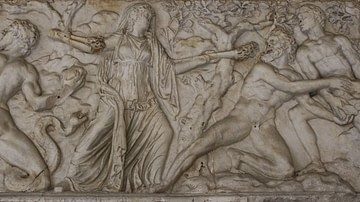Search
Did you mean: Livy?
Search Results

Definition
Amphora
An amphora (Greek: amphoreus) is a jar with two vertical handles used in antiquity for the storage and transportation of foodstuffs such as wine and olive oil. The name derives from the Greek amphi-phoreus meaning 'carried on both sides'...

Definition
Thales of Miletus
Thales of Miletus (l. c. 585 BCE) is regarded as the first Western philosopher and mathematician. He was born and lived in Miletus, a Greek colony in Ionia (modern Turkey) referenced as the birthplace of Greek Philosophy because of his high...

Definition
Philistines
The Philistines populated the coastal regions of Canaan from the 12th century BCE to their disappearance in 604 BCE. The word "Philistine" derives from the Hebrew ha-Plištim for the combination of several tribes of Syria and Judea with the...

Definition
Leto
Leto is a Titan and the mother of the gods Apollo and Artemis in Greek mythology. Leto's twin children were the result of an amorous encounter with Zeus, and to avoid his wife Hera's wrath, the Titaness was obliged to give birth on the remote...

Definition
Leptis Magna
Leptis Magna (aka Lepcis Magna), located in western Libya, North Africa, was a Phoenician city founded by Tyre in the 7th century BCE. Continuing to be a major city in the Roman period, it was the birthplace of Emperor Septimius Severus (r...

Article
Agriculture in the Fertile Crescent & Mesopotamia
The ancient Near East, and the historical region of the Fertile Crescent in particular, is generally seen as the birthplace of agriculture. The first agricultural evidence comes from the Levant, from where it spread to Mesopotamia, enabling...

Article
The Women of Athena's Cult
In ancient Athens, women had no life outside the home unless they were prostitutes or were engaged in religious activities such as festivals. Every Greek deity in every city-state had their own cult (sect) but the cult of Athena offered women...

Article
The Journeys of Paul the Apostle
The journeys of Paul the Apostle, as the New Testament relates in the Book of Acts, started with his conversion experience on the way to Damascus, after which instead of seeking to thwart the growing Christian movement, he helped spread it...

Article
Ten Ancient Rome Facts You Need to Know
Ancient Roman culture affected vast numbers of people across the known world of its time, beginning with the rise of the Roman Republic (509-27 BCE) and throughout the duration of the Roman Empire (27 BCE - c. 476 CE in the West and 1453...

Article
Temple of Athena Nike
The Temple of Athena Nike, on the southwest bastion of the Acropolis, is smaller than the other buildings behind it but no less impressive. It was completed in 420 BCE during the restoration of Athens after the Persian invasion of 480 BCE...